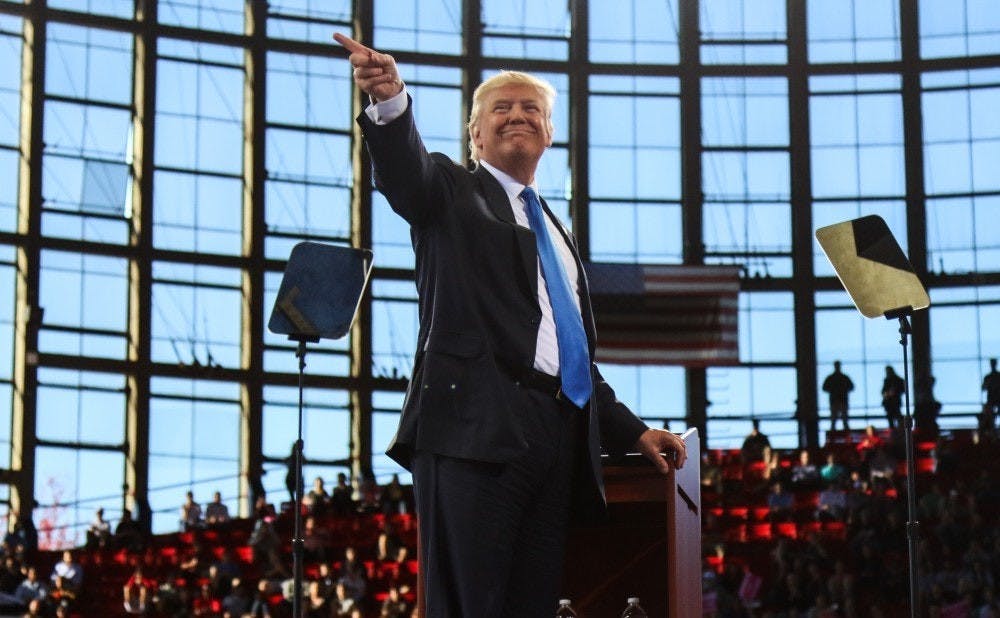For students that spent the summer off the grid or ignoring political news, Duke professors held a panel to unpack the summer's events.
The Tuesday afternoon talk—entitled "What Happened?!"—covered the major political happenings of the summer, including issues surrounding gerrymandering in North Carolina, evolving immigration policy and the results of the highly publicized summits, amongst others topics.
President Donald Trump's "zero-tolerance" policy at the U.S.-Mexico border was a hot topic.
“There’s definitely a racial component involved in these kids being separated from their parents,” said Kerry Haynie, associate professor of political science. “What you see President Trump doing here is trying to settle racial fears in the larger political arena.”
Suzanne Shanahan, director of the Kenan Institute for Ethics, explained that border-crossings have been steadily declining since 2000, and by early 2018 they were at an all-time low. When they spiked in April 2018, the Trump administration responded by instituting the "zero-tolerance" policy.
In May 2018, Attorney General Jeff Sessions announced that the Departments of Justice and Homeland Security would prosecute all that crossed the border illegally—even if seeking asylum. Because children cannot be held in federal prisons, if detained, they were separated from their parents.
On the international stage, Simon Miles, assistant professor of public policy, was critical of Trump's foreign policy, focusing on international summits Trump attended, including the NATO, G7, North Korea and Russia Summits.
Miles noted that Trump spoke scathingly when referencing the costs of NATO at the G7 summit while lauding the successes of his meetings with North Korea and Russia. Miles warned that a president who “finds it much easier to make common cause with America’s foes than his democratically elected friends” is a “troubling pattern.”
Miles added that neither the meeting with Russian President Vladimir Putin nor North Korean dictator Kim Jong Un resulted in any actual deals. Kim agreed to nothing more than to making a denuclearization agreement sometime in the ambiguous future, allowing for North Korea to string along an American administration that wants to solve the North Korea problem, Miles argued.
At the summit with Russia in Helsinki, Finland, Miles said Trump got the most he could hope for—the exchange of public relations smiles broadcasted on television—but no legitimate improvement in relationships between the two nations.
As for more local happenings, in January 2018, a North Carolina federal court found that North Carolina's congressional district maps were unconstitutional for favoring Republicans.
With the ruling, North Carolina became the first state in history to receive orders to redraw their map on the grounds of a partisan gerrymander. Uncertainty remains regarding whether the maps will remain in place ahead of November's midterm elections despite a trip to the Supreme Court and remand back to the lower court.
Haynie explained that the state has historically exhibited the worst cases of gerrymandering in the country, but that they reached a new level for the 2010 midterm elections as a backlash to President Obama’s election in 2008. Haynie said census data revealed that African American voters had been packed together by district lines so as to limit their voting power, a move struck down on grounds of racial gerrymandering. Since then, map-makers resorted to partisan gerrymandering—which has not won favor in courts.
Anna Broadwater, a first-year public policy graduate student, noted that in a time where staying up-to-date on political changes and happenings in the nation's capital can be difficult, the panel was great.
Tamba Mondeh, also a first-year public policy graduate student who attended the event, agreed with his classmate.
“Hearing from professors about current events is engrossing—I follow a lot of issues on the news, but hearing intricate details was helpful,” Mondeh said.
Get The Chronicle straight to your inbox
Sign up for our weekly newsletter. Cancel at any time.

